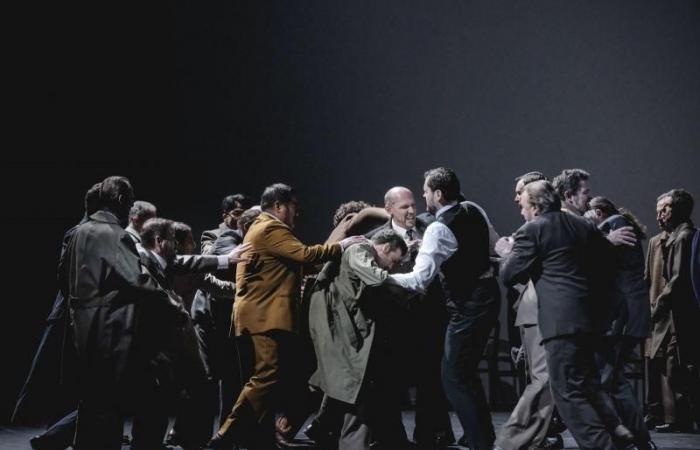
The atypical work of Albéric Magnard regains all its humanity this year with an ideal distribution.
« I buy the discontented, I gag the envious, I crush the rebels. » This sentence is not from an illiberal leader today, it is spoken by the dictator Heurtal in Guercoeur the magnificent opera by Albéric Magnard that the Opéra national du Rhin invites us to discover in a production that does it very moving justice (read our editions of 29 avril 2024). Destroyed in 1914 in the fire of the house that the composer was trying to defend against the German invader, the score was reconstituted by his friend Guy Ropartz, created in 1931 and never performed in France since, except for Michel's recording Plasson.
An atypical opera, like its author, idealistic and committed, raised in the French sound but nourished by Wagnerian influence. Returning from the dead to find that his work has been misused by his successors, the statesman Guercœur, in the symbolic name of contradictory aspirations, overcomes disillusionment by making way for hope in humanity.
Also read
Opera: in Strasbourg, the return of “Chevalier Magnard”
Dense orchestra
There is a lot of naivety in the libretto, but we don't want to make fun of it, as its sincerity and secular morality are so good in an era which has moved so far from utopias. There are many lengths in Act II dependent on a certain pompierism, but Acts I and III are absolutely beautiful, with a dense but clear orchestra and striking spatialization effects (remarkable choir and backstage fanfare). This allegory tends towards oratorio, but the roles allow the singers to express as much grandeur as humanity.
Also read
Albéric Magnard, the visionary
The distribution in Strasbourg is ideal. Stéphane Degout dominates it, the title role making him an artist of whom we can already say that at 48 years old, he will leave a name. The beauty and equality of tone, the transcendent quality of diction and the sincerity of accent: everything is unforgettable. This is no reason to forget the skin-deep lyricism of Antoinette Dennefeld, the powerful clarity of Julien Henric, the biting projection of Catherine Hunold, nothing having been left to chance in the choice of complements (the beautiful deep viola by Adriana Bignagni Lesca!).
Also read
The Musicians and the Great War: 14-18 drum beating
Always curious about scores to (re)discover, conductor Ingo Metzmacher put all his fervor into guiding the Strasbourg Philharmonic Orchestra in that of Guercoeur. With several grains of sand in the trumpets and flutes, his expressive baton revives and supports this vibrant music. Christof Loy's direction does not seek drama where none exists: its more than bare system is content with the division between the kingdom of the living (in white) and the dead (in black), separated by a corridor decorated with a landscape by Claude Lorrain. Sobriety which would be frustrating if the direction of the actors did not reveal the humanity of a deeply touching work, even in its clumsiness.





